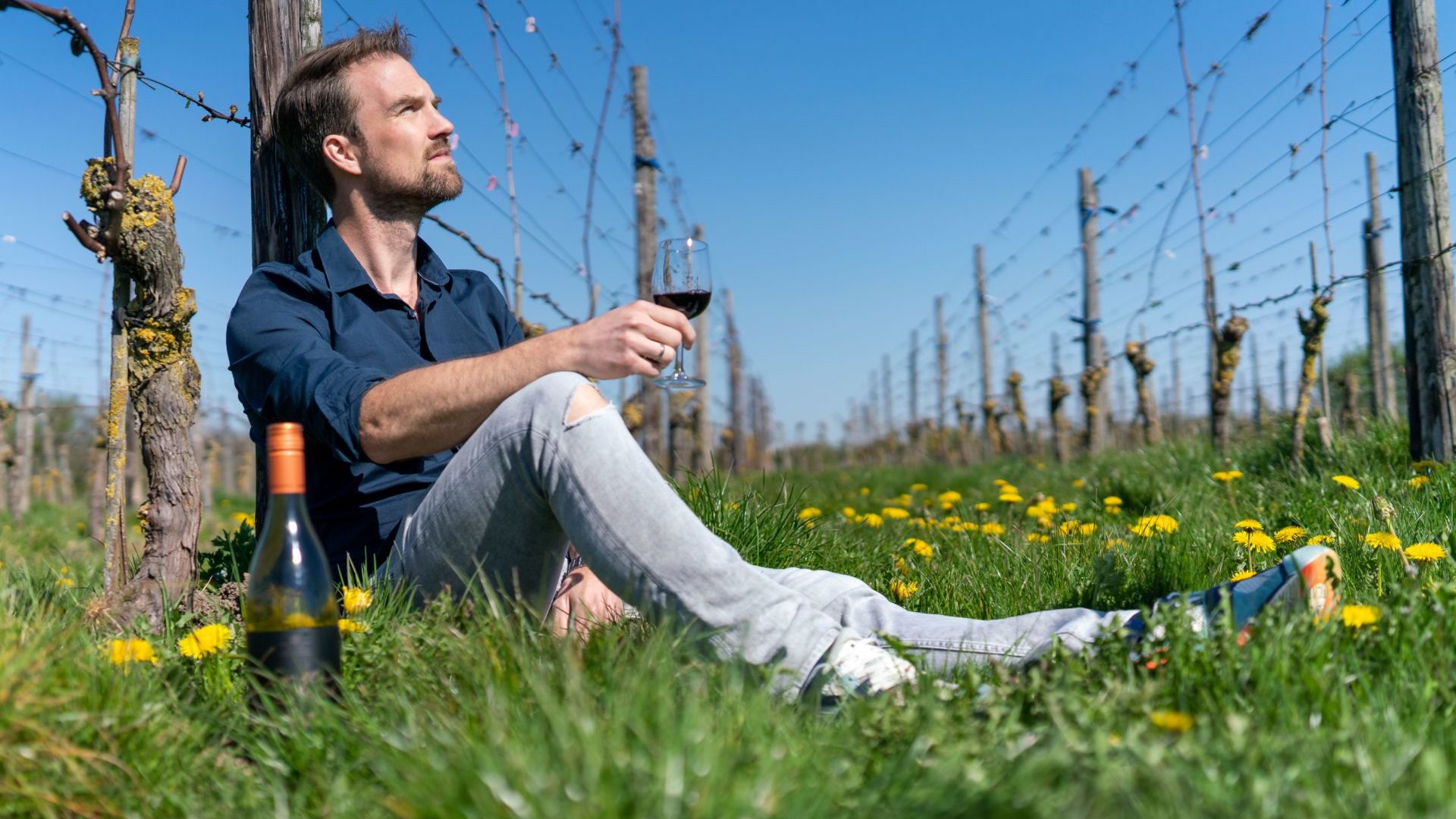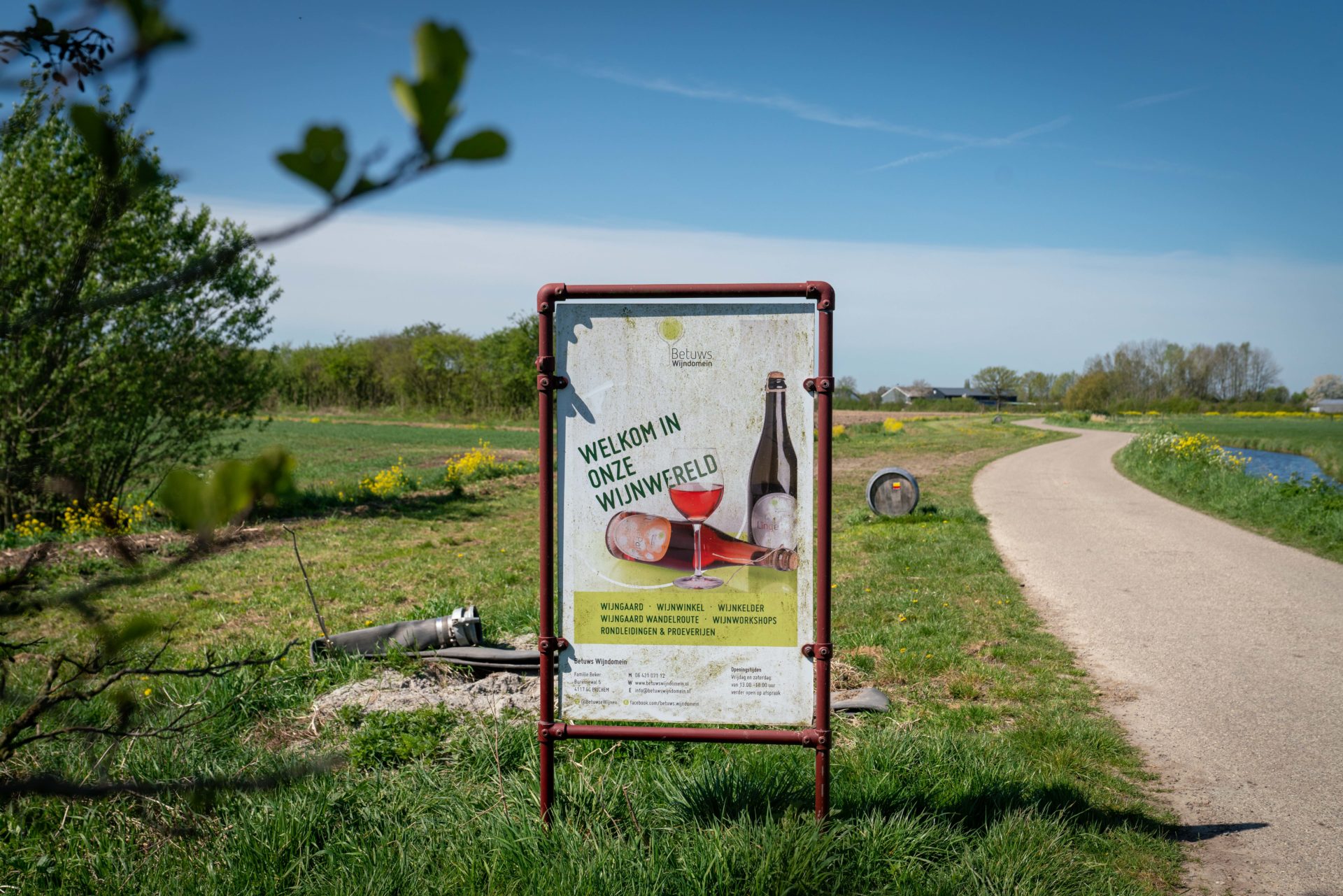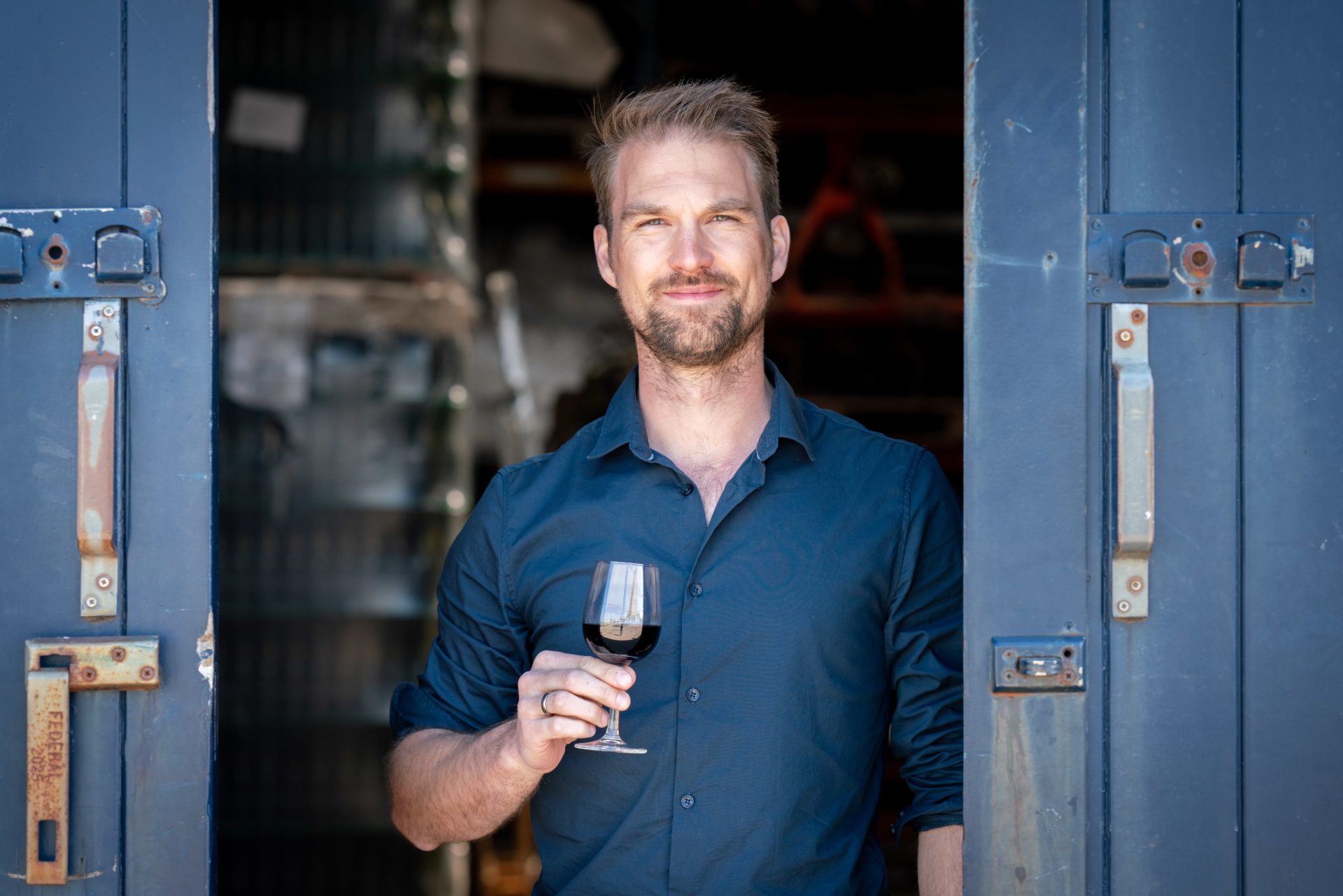Summer interview (8): For Koen Klemann, wine is a journey of discovery
-
 Koen Klemann. Foto: Erik van 't Hullenaar
Koen Klemann. Foto: Erik van 't Hullenaar
Raising Dutch viticulture to new heights by laying bare the details of the viticultural process: that is the ambitious mission of molecular biologist and entrepreneur Koen Klemann. This is also the approach he takes in his research on diseases such as ALS and Parkinson's. ‘I want to know everything.'
A beautiful spring day. The sun is high in the sky at the Betuws Wijndomein in Erichem, with its seven hectares of vines one the largest wine domains in the Netherlands. The vineyard is surrounded on all sides by apple and pear orchards, and in the distance, the windmill blades are slowly turning – the polder is rarely wind-free.
Within a few weeks, with the orchards in full bloom, it will be packed; blossom tours are popular among day trippers. But on this afternoon in April, the first buds on the vines are still not out. ‘Until the Ice Saints days, in mid-May, wine growers often have sleepless nights,’ says Koen Klemann (36). ‘Until then, there’s a chance of night frost, which can lead to them losing part of the harvest.’
Klemann knows the Betuws Wijndomein like the back of his hand. In an effort to learn more about winemaking, the molecular biologist worked here for a few years as a volunteer. He spent countless hours wandering between the vines with a pair of pruning shears. In the wine cellar, where grape juice ferments into real wine, he bombarded wine grower Diederik Beker with questions. All with a single mission: understanding everything there is to know about the process of viticulture.
Now Klemann, who lives with his wife and two sons in a village near Zaltbommel, is himself teaching courses at the Betuws Wijndomein. These are courses for beginners who want to know more about the different grape varieties, or learn how to make wine themselves. He teaches these courses under the banner of his one-man business: WijnWetenschap.
Practical objective
This interest in wine emerged during his studies in Molecular Life Sciences at Radboud University, explains Klemann. ‘The chemistry courses got me interested in how wine is produced, in particular the yeasts that are used in the wine cellar, the cell processes that take place there, and the impact that these processes have on the wine. I read more and more scientific articles on viticulture, and one thing led to another.’
After completing his studies, Klemann started a PhD research project on the underlying molecular mechanisms of neuropsychiatric diseases such as Parkinson’s and ALS. ‘I wanted to do research with a practical objective, namely to come one step closer to healing these diseases. My interest in biology and the link with clinical work made it a logical next step. Not that I personally know anyone with Parkinson’s or ALS.’
Since 2017, Klemann has worked in Mercator I at DrugTargetID. This Radboud University spin-off, initially created under the umbrella of the University, is now independent. ‘We try to understand the biological mechanisms that cause these diseases by studying large data sets,’ he says.
The method that Klemann used in his PhD, i.e. creating molecular landscapes of patients with Parkinson’s, is the company’s core task. Landscapes like these are complex networks and overviews of all proteins and metabolites, and their interactions, that lie at the basis of the disease. ‘We further refined and expanded this method over the years; now pharmaceutical companies are elaborating further on our work. Based on the druggable targets we identify – these are the proteins on which a potential medicine can be developed – pharmaceutical companies start follow-up studies to develop medicines. But we also work a lot with the Human Genetics department of Radboud University.
Evening course
Shortly after defending his PhD thesis in November 2017, Klemann signed up for a wine grower evening course. For two years, every Thursday evening, he drove 75 minutes there and back to Hasselt in Belgium. There he learned how to design and maintain a vineyard, and how to vinify wine, aka turn pressed grapes into wine.
After completing this course, the inquisitive Klemann wanted to put his theoretical knowledge into practice. He contacted the Betuws Wijndomein, asking for an opportunity to gain experience. Which he was given. ‘It was nice, alongside my work on the laptop, to spend one day a week in the fresh air.’
Why do you want to know everything about wine?
‘I enjoy discovering new facets of how grape varieties respond to different conditions or how wines can be further optimised in the vinification process in the wine cellar. This combination of biology and chemistry really appeals to me.’
‘The wine world is full of stories and romance’
Do you take the same scientific approach to wine as to your research on neuropsychiatric diseases?
‘At DrugTargetID we collect as much data as possible, and then we scan these data for cues, like real trackers. We dig in the system of a disease to see whether we can crystallise something out of it. For me, wine is more of a journey of discovery. Wine growers often act nonchalant about it, but they actually work with great precision. If something goes wrong in the process, they want to know the reason. It’s a systematic, scientific way of working. And with the best wine growers, you can taste it in their wine.’
Did you start WijnWetenschap because of all the nonsense being spread about wine-making?
‘The wine world is full of stories and romance, but the truth always lies somewhere in the middle. I enjoy finding out where exactly in the middle.’
Heavy clay soil
One of the biggest misconceptions about wine-making, explains Klemann as he strolls between two rows of vines, is that it is impossible to do in the Netherlands. A lot of people also think that you can only grow vines on limestone soil. ‘This is completely untrue,’ he says. ‘Limestone soils are excellent for vines, particularly because of their good water balance. On other soils, you have to adjust your cultivation process more. This vineyard, for example, has a heavy clay soil. This means that you have to make sure the soil doesn’t become too compacted, and create good drainage for excess water. If you grow grapes on sandy soil, you have to take into account that you will have to add organic material.’
There is also a lot of romanticising around aromas in wine, says Klemann. ‘In wines from maritime regions, such as Muscadet, or wine regions in locations where there once was a sea, like Chablis, people often discern a briny taste. With wines that grow on granite, they often talk about aromas such as flint. They attribute this to the type of soil. These stories often appear on the wine labels, but this is just a marketing ploy, unsupported by any scientific evidence. Minerals that attach to the crystal structure of a stone aren’t soluble, so they’re simply not absorbed by the vine roots.’
Aren’t you just dispelling our romantic ideas about wine-making?
‘But don’t you find it just as romantic that wine growers have to put so much scientific knowledge and energy into the wine in your glass?’ He laughs: ‘Although I do enjoy a good chuckle whenever I read one of those labels.’
Your PhD supervisor, Bas Bloem, only drinks organic wine, because the use of pesticides in the vineyard may trigger diseases such as Parkinson’s.
‘Various pesticides have been linked to Parkinson’s, including fungicide Mancozeb and products that contain glyphosate. It’s a good thing that these substances are forbidden or subjected to strict rules if they turn out to be harmful to people. Where possible, it’s always a good idea to make organic wine. But in the Netherlands − and in many other parts of Europe − this isn’t always possible. The wet and cold summer we had last year, for example, made it impossible to make a good wine in the Netherlands in an organic way. This kind of weather means more fungi in the vineyard, such as mildew, and these have to be kept in check somehow. In organic vineyards, by late August, there wasn’t a single leaf left on the vines, which meant the grapes couldn’t ripen, and entire harvests were lost. If you’re running a commercial wine company, you sometimes have to make different choices. Luckily, there are strict regulations concerning pesticides, and science, with the help of people like Bas Bloem, is working to make sure that these regulations are implemented if there are any indications that the substances used may be harmful for the growers.’
Busy schedule
Four days a week, Klemann commutes to the Radboud University campus for his work at DrugTargetID, and one day a week he is at home with his two sons. His work for WijnWetenschap is something he does in his free time. ‘On Thursday evening, I give wine courses or write articles,’ he says. ‘I offer vineyard consultancy in the evenings and at weekends. It’s a busy schedule, but a fun one.’
Would you like to devote more time to your wine company in the long term?
‘I would like to devote half my time to it, but the Dutch wine sector is too small for that. Of the two hundred vineyards, thirty to forty are commercially active. They no longer need my expertise. It’s mostly new wine growers who want to know how to start a vineyard, and luckily, there are new wine growers every year.’
What should people who want to start a vineyard know?
‘The most important thing is to avoid beginner’s mistakes. People only want to design their vineyard once, and they hope that it will last thirty years. So it’s a bit of a disappointment if they have to dig up their vines after two years because they planted a grape variety that doesn’t ripen. Or they find out that they didn’t work the soil properly. It’s fun to help people figure these things out.’
Do you also give advice to the Betuws Wijndomein?
He laughs: ‘Here, the information flow is usually in the other direction. Wine grower Diederik knows so much about viticulture; he’s been making wine since 2004. At the start of this year, we did work together in presenting a survey to the Professional Association for Dutch Wine Producers, asking them which of the yeasts they used in the wine cellar were suitable for the grape varieties grown in the Netherlands. I also conducted a study on lowering the sugar percentage in grape juice; because of the increasingly warm climate in the Netherlands, Dutch wines sometimes have too high an alcohol percentage. We emphasised a few solutions, such as adjusting the vine canopy [for example by pruning the plant differently, Eds.], without this affecting the wine’s aromas. In this way, we hope to raise Dutch wine production to new heights. In the long run, I’d like to develop more courses for wine growers, including retraining programmes. At the moment, we’re still too dependent on the knowledge available in Germany or France. This is a project for the next five to ten years; I don’t want to put too much pressure on it. It needs to remain a fun thing.’
Is Dutch wine a good alternative to German or French wines?
‘Certainly wine growers who have been in the industry for a longer time, and who therefore have a lot of knowledge and experience, can easily compete with their French and German colleagues. These wine growers also perform well at international wine competitions. Due to the cool and humid climate, Dutch vineyards are more likely to suffer from diseases and fungi than, for example, vineyards in the South of France. So in the Netherlands we have to put more effort into the actual cultivation process. This makes the wines proportionally more expensive.’
‘A few more degrees is no problem in the Netherlands, but the question is what other shifts this will bring’
And therefore more or less unaffordable for students?
‘It’s true that you won’t find a Dutch wine for under €5; it’s a fact that good wines cost money. Having said that, students do pay €3-€4 for a speciality beer.’ He laughs: ‘So over €10 for an entire bottle of good-quality wine should also be manageable.’
Does climate change mean that the Netherlands will become better suited to wine-making in the long run?
‘In part, yes, but climate change doesn’t bring only warmer, but also more extreme weather. A few more degrees is no problem in the Netherlands, but the question is what other shifts this will bring. If a few weeks from now, we’re suddenly faced with a huge whirlwind or heavy hailstorms, we will immediately lose part of the harvest.’
Which wines do you personally like best?
‘I prefer discovering and experiencing new flavours than having the idea that I’ll be drinking the same wine for ever and ever. For the rest, it all depends on the moment. With a substantial meal, I enjoy a strong red wine; sitting out on a terrace, I prefer a white wine with fresh acidity.’
Have you already started a vineyard of your own?
‘No, not yet. I know how much work is involved; it’s not something you can simply combine with a demanding job. But it’s definitely on my wish list. I’d love to have a vineyard of half-a-hectare as a hobby. If possible, abroad, if the rest of the family agrees.’
Summer tip
‘With its seven hectares of vines, the Betuws Wijndomein in Erichem is one the largest vineyards in the Netherlands. Wine grower Diederik has already won some impressive prizes in the Netherlands and abroad. When the weather is nice, join us at the Betuws Wijndomein to walk the ‘klompenpad’, have a picnic in the vineyard, or enjoy a glass of wine on the terrace.’





